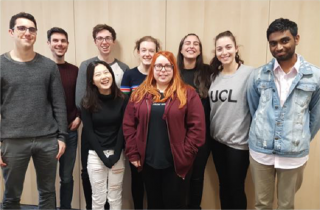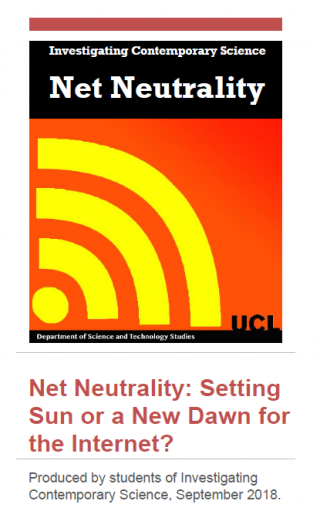Second and third Year BSc students follow in the footsteps of Simon Schaffer and Helen Longino, by publishing an STS Occasional Paper.

The authors of Occasional Paper 8 - (l-r) Raphael Piccolin, Daniel Shuttlewood, Ho Cheung, Josh Huntley, Alice Conway, April Wheeler, Alia Asad, Ralitsa Tchobanova, and Jason Murugesu (Holly Clarke was unavailable)
Net Neutrality (NN), is the concept that internet access should be available to all - that internet providers cannot offer faster access to preferred websites, creating a two-tier system. This idea has been challenged in recent years, and STS students are among the first to tackle the subject.
During the
Available via the STS Website, 'Net Neutrality: Setting Sun or a New Dawn for the Internet?' looks at the very future of the internet. Chapters look at whether new regulations will disproportionately benefit Internet Service Providers and online monopolies, the effect on innovation and emerging technologies, and whether the US repeal of net neutrality will cause further problems in the UK. Others analyse the evolution of the internet, and ask whether it was ever neutral in the first place.
The students involved - Alia Asad, Ho Cheung, Holly Clarke, Alice Conway, Josh A Huntley, Raphael Piccolin, Daniel Shuttlewood, Ralitsa Tchobanova and April Wheeler - came from a variety of courses around UCL, and used their varied knowledge to approach the issue from such a wide range of perspectives. Module Tutor Melanie Smallman congratulated the students on their work. 'The publication of this paper demonstrates just how hard these students worked. The final report concludes that the current debate around the subject is too polarised, and needs to be opened up to take account of nuanced arguments about the kind of future we want - the kind of nuance that can be found in this report.'

The report is summarised by three recommendations, reached as a result of the students' work. They are:
- The NN debate needs to be reconsidered in light of technology’s inherent non-neutrality, so as to attain a more adequate approach to managing the Internet and its openness via acknowledging the presence of cultural assumptions and values underpinning it.
- Governmental power over the network’s core resources should be recognized as necessary in light of it providing some common rules of use, for as long as this is done openly, democratically and responsibly. It should also not restrain the network’s evolution beyond what is necessary to achieve regulatory aims.
- As users can potentially impact and make informed decisions about the Internet, a user-focused approach to the NN debate can be embraced, where customers are clearly informed about non-neutral features, processes, and policies. User-led appraisal of non-neutral policies can best balance consumer’s safety with innovation.
"Net Neutrality - Setting Sun or a New Dawn for the Internet?" is available to read for free and can be downloaded from the STS website.
For more articles from the department's Alchemy newsletter, visit the Alchemy page.
 Close
Close

